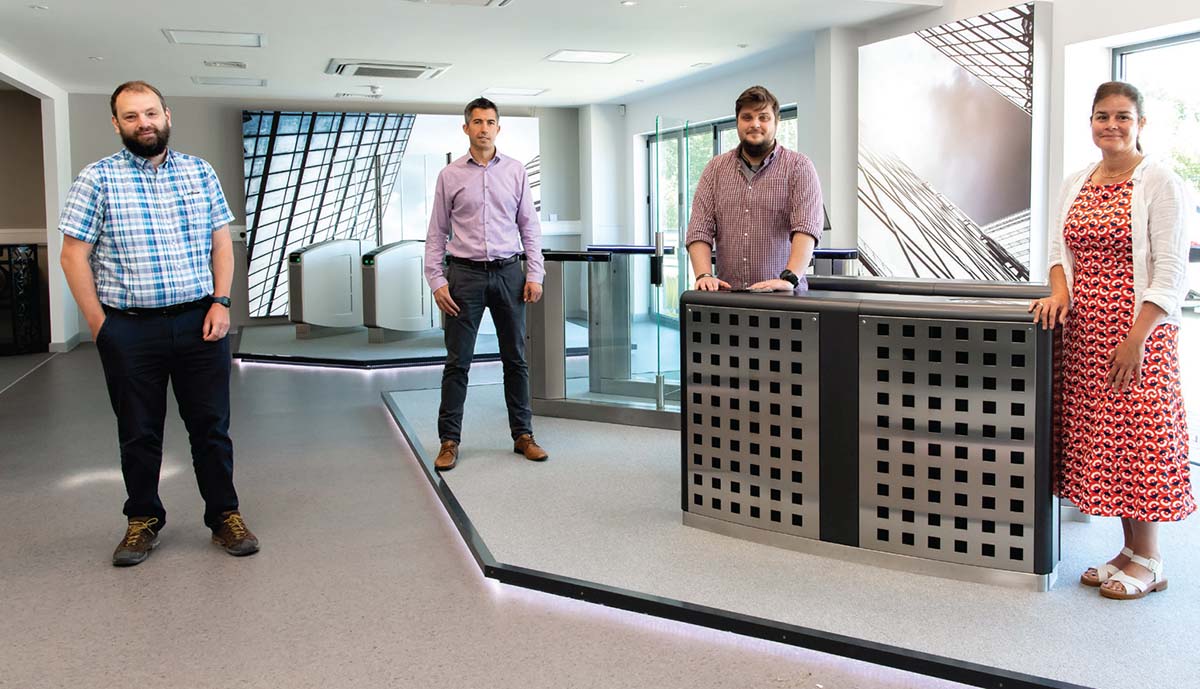
How a Knowledge Transfer Partnership between the University of Sussex and Gunnebo Entrance Control is advancing security gate technology
Capturing students’ silly – and sensible – walks through a tunnel of sensors will help to provide key information for the development of new-generation security gates used in businesses and airports.
The activity is part of a joint project between the University of Sussex and Gunnebo Entrance Control (GEC), a design and manufacturing company of security gates.
Research by experts in computer vision and sensor technology at the University is helping to develop an algorithm for detecting ‘people flow’ through speed security gates.
University students are among those providing the moving bodies required to test the effectiveness of the equipment at Gunnebo’s UK laboratory in Maresfield, East Sussex.
The two-year collaboration is partly funded by a grant from Innovate UK through a Knowledge Transfer Partnership (KTP), a government initiative to encourage the sharing and development of university research with business.
Kate Thorpe, Deputy Head of Business Engagement at the University of Sussex, said: “It’s exciting to see innovations at the University applied to real world settings and great to have an opportunity for students to see the results of industry and University collaboration first hand too.”
The project is led for Sussex by Dr Phil Birch, Reader in Engineering at the University, and Professor Daniel Roggen, Professor in Wearable Technologies. They have expertise in the development of infrared devices to track movement.
Facilitating the knowledge transfer between the University and Gunnebo is Dr Peter Overbury, a Sussex graduate whose post-doctoral work has focused on security analytics.
Peter says: “My role is to take the KTP project all the way through the development of a sensor/machine learning algorithm for the detection of people in gates. That also flows into other things, such as increasing gate logic so we can ease users going through.
He adds: “It’s so rewarding to see how academic research can be applied and enhanced in a commercial element. Gunnebo may give me feedback that their customers would like a particular type of cabinet – perhaps one with more glass that doesn’t impede vision. But that presents a challenge for incorporating sensors and other technologies.
Gunnebo, which began in Sweden in 1764, is a worldwide leader in the development, design and marketing of security gates for sales to airports, metro and public transport, stadia and mass transit, office and building security, with 90% being exported globally.
The company focuses on protecting people, assets and buildings by controlling access, using passage barriers and detection systems. It manufactures indoor and outdoor gates, from simple turnstiles to advanced speed gates and security revolving doors.
Detection technology is key to the company’s product offering because it is pivotal to balancing security, safety and speed. Improved detection will therefore be of direct benefit to the gate users and provide enhanced protection while optimising throughput, whether they be attending their office workplace or checking in for a holiday at the airport.
Developing a new generation of ‘speed gate’ (the fast-flow type used in airports and businesses) will position Gunnebo as a disruptor and raise the bar for industry. Like many companies who benefit from the KTP, working with universities in the development stage means they can bring in knowledge and different levels of expertise.
Iain Port, VP R&D and Operations at Gunnebo, says: “To stay competitive, we have to innovate all the time. Customers expect new things, so we are always looking at ways to improve our products – from introducing sensors that detect speed as people approach barriers, to incorporating cameras and thermometers to detect body temperature.
“About four years ago we employed a technologist to advance our technological platform. By doing that, we found that we were getting exposure to lots of new things, but we didn’t have the horsepower to develop and commercialise them quickly.
“Our intention is to differentiate ourselves from a technology point of view and transfer some advanced technology development knowledge into our R&D team in parallel. This will help Gunnebo continue to develop new market leading products.”
The two year KTP project began in 2020. Kate says: “To win KTP funding, the two organisations working together identified a challenge, that Gunnebo wanted to address, matched it with the academic expertise at Sussex and together we compiled an application for Innovate UK funding.”
The ambition for Gunnebo is to grow sales >10% pa to become global number one by 2023. Connecting with expertise from academics at the University of Sussex Sensor Technology Research Group will address current security challenges and embed knowledge in the R&D team at Gunnebo to enable future product development post-KTP.
The partnership demonstrates how all parties can benefit through the commercialisation of research taking place at the University.
Dr Sue Baxter, Director of Innovation & Business Partnerships at the University of Sussex , says: “I’m delighted that we have formed this partnership with a local company that has potential for world-wide adoption. Our work with Gunnebo illustrates the competitive edge that can be achieved for companies by working hand in hand with universities.”





